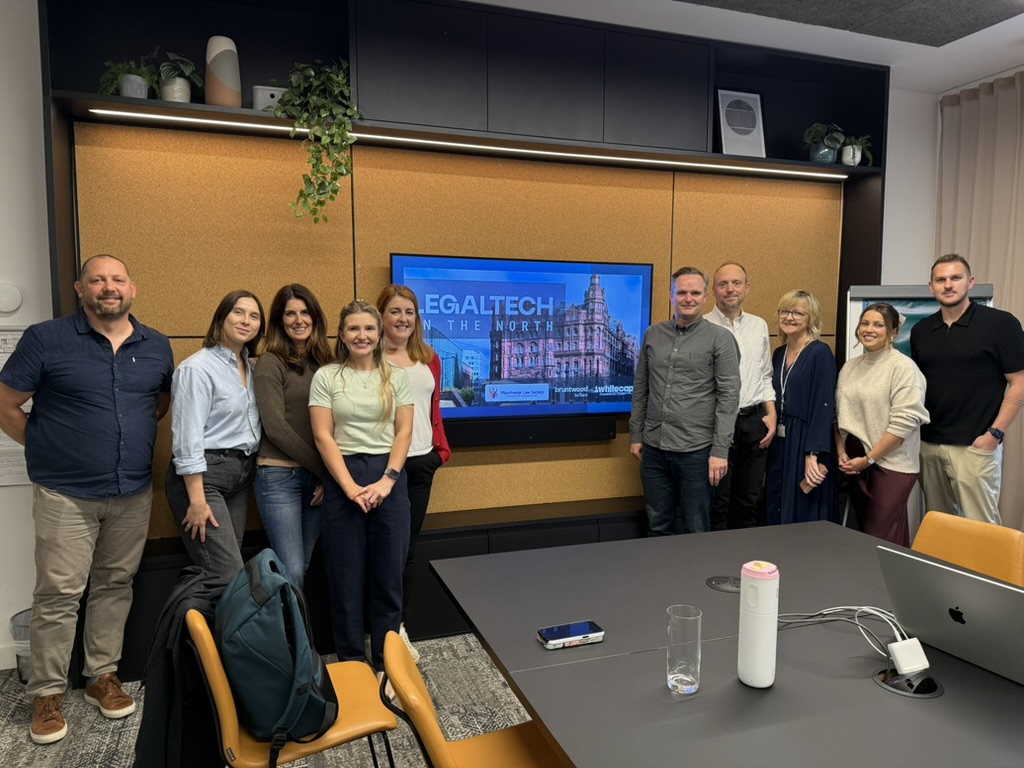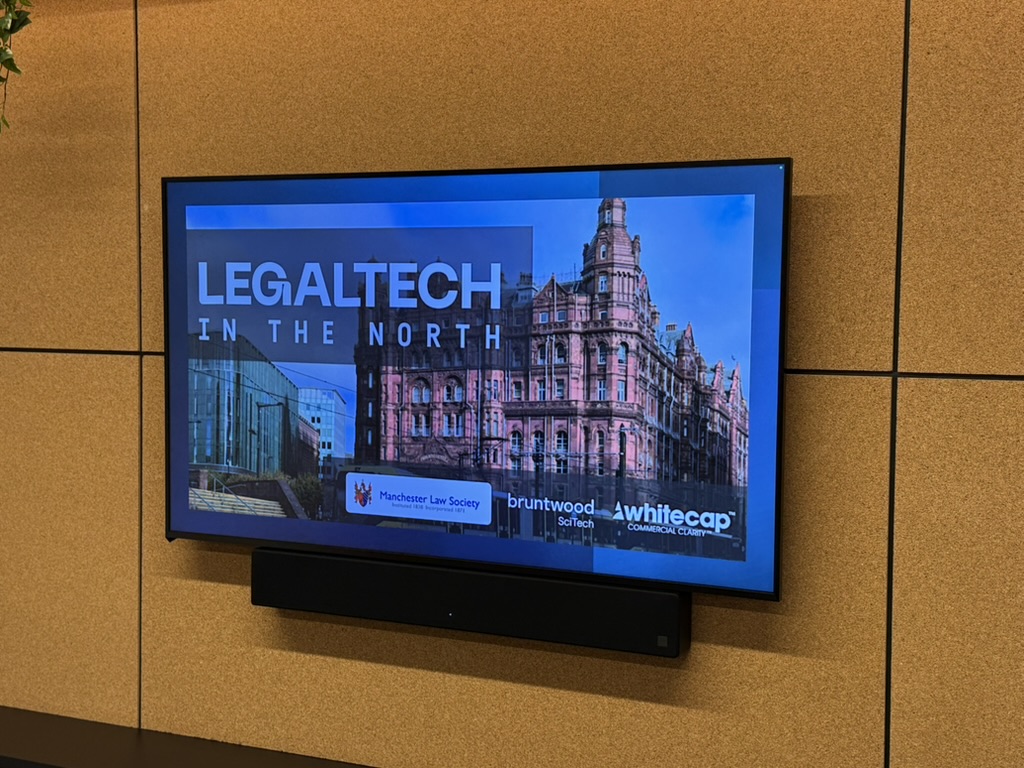 These sessions aim to convene voices from across the ecosystem including law firms, tech providers, academia, policymakers and investors, to share experiences, and explore opportunities for the growth of LegalTech in the North. The discussions build on our workover recent years to develop the LegalTech in Leeds programme, which has been running since 2022.
These sessions aim to convene voices from across the ecosystem including law firms, tech providers, academia, policymakers and investors, to share experiences, and explore opportunities for the growth of LegalTech in the North. The discussions build on our workover recent years to develop the LegalTech in Leeds programme, which has been running since 2022.
The Manchester roundtable, hosted in partnership with Bruntwood SciTech and Manchester Law Society, brought together a wide mix of perspectives with attendees drawn from a range of organisations including CG Professional, Founders Law, Shoosmiths, Summize, TrialView and University of Manchester. The discussion highlighted both the opportunities and challenges facing the sector, with AI, cultural resistance and client expectations recurring as central themes.
AI as a catalyst and a concern
AI ran through every part of the discussion. It is seen as a turning point for the sector, reshaping roles and expectations across law firms, clients and educators. Some organisations are piloting tools with structured frameworks and governance in place, while others are using them more informally on an ad hoc basis. This patchwork approach increases inconsistency and risk, underlining the call for clearer guidance from regulators and insurers, and for firms themselves to take a more deliberate approach to responsible adoption.
“AI isn’t just another tool, it’s a turning point for the sector. The challenge is that many lawyers are already using it informally, without the right frameworks in place.”
“We urgently need regulators and insurers to set clear parameters for AI in legal services. Without that, adoption risks being inconsistent and risky.”
“There’s a contradiction in the market. Lawyers talk about being resistant to AI, but we keep seeing real-world cases where they’re already using it.”
Regional challenges
Differences between London and the regions were a recurring theme. Many procurement decisions are still taken centrally in the capital, restricting the ability of regional firms to move quickly and shape their own innovation agenda. Activity sparked by events in London was seen to generate faster follow-on engagement compared with the North, raising questions about how to avoid a two-speed LegalTech landscape.
“Procurement decisions are still controlled centrally in London. That leaves regional offices without the autonomy or budget to act on innovation opportunities.”
“We’ve found it’s far easier to run LegalTech events in London or the US. Interest in Manchester is more fragmented, even though the need is just as great.”
Pricing models and client pressure
Debate around pricing models highlighted the tension between traditional structures and genuine innovation. While some firms are moving towards fixed fees, others stressed that the real transformation lies in productising services – turning legal expertise into scalable, repeatable solutions rather than repackaging the same advisory work. Clients are exerting growing pressure in this direction, expecting efficiency and lower cost, and assuming that firms are already using technology to achieve this, whether or not that is the reality.
“Clients assume you’re already using technology to work more efficiently and they expect to see those benefits in the price, whether or not the firm has actually adopted it.”
“Fixed fees are not transformative on their own. True change comes from productising services so they can be delivered consistently and at scale.”
“The billable hour is still the elephant in the room. It actively discourages efficiency and makes innovation harder to push through internally.”
The rise of legal ops and education
Legal operations functions are emerging as important enablers of change, bridging the gap between advisory work and operational delivery. Education also featured strongly in the discussion. Universities are beginning to adapt curricula to include areas such as app development, commercial awareness and cross-functional collaboration. Yet there are concerns that over reliance on AI could reduce exposure to fundamental legal tasks, making it harder for junior lawyers to build core skills and experience.
“The rise of legal ops is a positive step, but it’s not enough to just sit alongside lawyers. To be effective, you need to have been a lawyer yourself.”
“Students are split. Some are excited about tech-enabled careers, while others fear AI will make lawyers obsolete. That makes it vital to balance digital skills with core legal training.”
“We’re teaching law students not just doctrine, but how to build apps, read balance sheets and collaborate with other business functions. Those are the skills firms are now demanding.”
Culture and change management
Cultural resistance was recognised as one of the most significant barriers to adoption. Although charging by the hour seems to be declining in prevalence, traditional billing models can disincentivise efficiency, meaning firms are structurally rewarded for doing things the long way. At the same time, senior decision makers may be disconnected from the day-to-day inefficiencies technology could address. Participants agreed that technology on its own is not enough – success depends on strong leadership, active change management, and transparent sharing of success stories across the sector.
“The billable model rewards inefficiency. Unless that changes, cultural resistance to tech adoption will remain entrenched.”
“Law firms don’t want a sales pitch. What they want is education, training, and credible examples of what works in practice.”
Looking forward
The Manchester roundtable highlighted the complex dynamics shaping LegalTech adoption in the North:
- AI is accelerating change, but clear frameworks are needed
- Clients are setting the pace, with rising expectations for efficiency
- Regional autonomy is limited, with many decisions made centrally
- Legal ops and education are emerging as enablers of transformation
- Culture and incentives remain major barriers to progress
The clear message was that LegalTech is no longer optional. The tools exist, clients demand them and future lawyers are ready to embrace them. The challenge now is to ensure that regional firms and stakeholders can act decisively to capture the benefits, creating a LegalTech ecosystem in the North that is both vibrant and forward-looking.
If you would like to participate in future sessions, please email [email protected]
